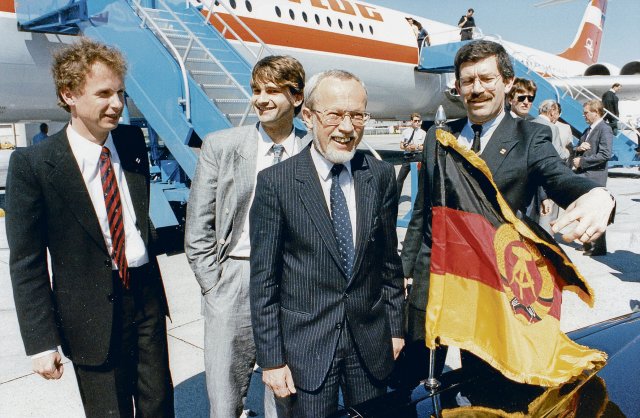Matthias Gehler (l.) with his then boss Lothar de Maizière
Photo: private
The book title “Do you want unity – or not?” requires an explanation. Hermann Tiedje, editor-in-chief of “Bild,” shouted this sentence into the telephone when Matthias Gehler complained to him on August 2, 1990. The tabloid had appeared that day with the headline that stirred up social envy: “GDR: People are despairing – the ministers are on vacation.” Including twelve portraits with the comment: “That they are not ashamed.”
The claim, shared millions of times, was a lie. The ministers in Lothar de Maizière’s government did what all GDR citizens were doing at the moment, provided they were still able or allowed to do so: they worked. And the government spokesman, who was justifiably outraged, had to reject this slander.
Matthias Gehler was an editor at the CDU newspaper “Neue Zeit” and was made his advisor by the new CDU general secretary at the end of 1989. And after the People’s Chamber election on March 18, Hans Modrow’s successor appointed him State Secretary and government spokesman. The trained electrician from Crimmitschau had studied theology, was a pastor and songwriter and had always remained what one would call a loyal GDR citizen. Also in this outstanding function. To this day, he still judges the people he dealt with loyally. Distance only becomes clear in the vivid description of events in which the protagonists expose themselves. For example, Gehler is driving to Adlershof with a federal minister, with security vehicles rolling in front of and behind their limousine. »The guest asks my chauffeur to drive a little slower and looks at the Wilhelminian-era buildings on the right. ‘This is a fantastic house. Can you get it for me? I would like to buy it.'”
Or cabbage. The dislike of the two German heads of government could hardly be disguised; the subtle, sensitive de Maizière and the rough fat man from the Rhine clearly did not like each other. The antipathy was visible even in the proportions. Kohl used his physical power, the GDR government spokesman tried to minimize this. During a photo shoot, for example, he asks the Chancellor to stand on the stairs one step below his boss’s. »He sees my suggestion as presumptuous. He doesn’t speak a single word,” writes Gehler. “Then he stands outside on the same step as de Maizière and looks at me. I nod encouragingly at him. Finally, annoyed, he steps down a step and immediately sends me a triumphant look: he still towers over little Lothar de Maizière.
nd.Kompakt – our daily newsletter

Our daily newsletter nd.Compact brings order to the news madness. Every day you will receive an overview of the most exciting stories from the world editorial staff. Get your free subscription here.
But the GDR Prime Minister has a quicker mind than Kohl, is wittier and more eloquent. This became clear from their first meeting at the beginning of February 1990. Kohl thought he had to ingratiate himself with the representative of the workers’ and farmers’ state by saying “that he himself came from a humble background. His father was a normal tax officer and the family had to work hard to achieve their wealth. To this, de Maizière confidently replied that he could not serve with such a modest biography. He comes from a more educated, bourgeois family. Nevertheless, given the tasks that need to be accomplished, we can try to work well together.”
Gehler’s memories are full of such treasures. Even though you thought you knew everything about the last six months of the GDR, you are amazed at what new, enlightening and unknown things you learn. The book is in part also a rescue of the honor of those women and men who were blamed and said to have squandered the GDR. No, they certainly didn’t: many of them defended this country even though they had set out to abolish it. And be it by driving up to the White House with the GDR flag or taking a stand in the Kremlin.
At the end of April 1990, a conversation took place with Soviet Prime Minister Ryzhkov. The atmosphere was tense, Gehler writes, and frosty. Ryzhkov told the delegation from Berlin that the GDR wanted to restrict or even stop its natural gas imports from the Soviet Union. “De Maizière remains calm and asks back: ‘Where did you get this information from?’ Ryzhkov: ‘From our embassy on the other side of the wall.’ De Maizière hardly waits for the translation: ‘If you negotiate with us, then you should think that you have a message on our side of the wall too.'” After this confrontation, the atmosphere noticeably relaxed, Ryzhkov relaxed when he saw that he was not sitting opposite a puppet. »The conversation becomes unconventional and even funny. We’re talking about further business deals that are in the offing.”
Gehler also had a deputy who he selected and hired. Her name was Angela Merkel. How he describes it: terrific. You have to read this. »Her public speaking always had something lecturing about it, her actions were rarely spontaneous – although she can be pleasantly spontaneous. As a public relations worker, she was a bad choice by today’s standards because she shied away from the public.”
It’s a good thing that Matthias Gehler delayed publishing it for so long. In this way he prevented his memories from being lost in the flood of memoirs of the early years of unification, or from adapting too much to the mainstream (after all, he was editor-in-chief at MDR until his retirement). This is how we learn things that have always been suspected but have never been read in black and white.
Incidentally, Tiedje also received an appropriate answer to his question as to whether Gehler wanted unity or not. “So I shouted back: ‘But not like that – and not with you!'” As is well known, things turned out differently.
Matthias Gehler: “Do you want unity – or not?” Memories of the government spokesman. Edition Ost, 256 pages, br., 18 €.
#ndstays – Get active and order a promotional package
Regardless of whether it is pubs, cafés, festivals or other meeting places – we want to become more visible and reach everyone who values independent journalism with an attitude. We have put together a campaign package with stickers, flyers, posters and buttons that you can use to get active and support your newspaper.
To the promotional package
